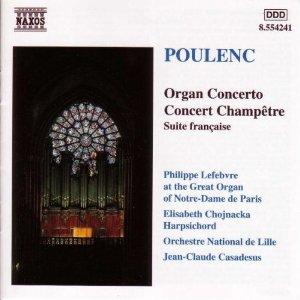Poulenc Organ Concerto; Concert champêtre; Suite française
View record and artist detailsRecord and Artist Details
Composer or Director: Francis Poulenc
Genre:
Orchestral
Label: Naxos
Magazine Review Date: 6/1999
Media Format: CD or Download
Media Runtime: 59
Mastering:
DDD
Catalogue Number: 8 554241

Tracks:
| Composition | Artist Credit |
|---|---|
| Suite française, d'après Claude Gervaise |
Francis Poulenc, Composer
Elisabeth Chojnacka, Harpsichord Francis Poulenc, Composer Jean-Claude Casadesus, Conductor Lille Symphony Orchestra |
| Concerto for Organ, Strings and Timpani |
Francis Poulenc, Composer
Francis Poulenc, Composer Jean-Claude Casadesus, Conductor Lille Symphony Orchestra Philippe Lefebvre, Organ |
| Concert champêtre |
Francis Poulenc, Composer
Elisabeth Chojnacka, Harpsichord Francis Poulenc, Composer Jean-Claude Casadesus, Conductor Lille Symphony Orchestra |
Author: Lionel Salter
Elisabeth Chojnacka gets off to a head start against most others who have recorded the Concert champetre by using the right kind of instrument, like her former teacher Aimee van de Wiele (whose 1960 recording of it I was praising only in January): where they have vainly pitted the small sonority of pseudo-authentic instruments against Poulenc’s absurdly over-large orchestra, she understands that it is much sillier to play newish music on a period instrument than old music on a modern one. The effective proportions secured here between her deft playing and the orchestra also owe much to Jean-Claude Casadesus’s nice sense of judgement and to the work of an excellent recording team. The many changes of pace in the work (which can be troublesome) are adroitly managed, and the ‘Sicilienne’ has a nice relaxed flow.
It was particularly perverse of Poulenc to ask a harpsichord to contend with large brass and percussion sections and then, a decade later, employ only strings and timpani in his concerto for the intrinsically far more powerful organ; and that perversity is underlined here by using the massive organ of Notre Dame, Paris (whose imposing specification is supplied for the satisfaction of organ buffs) – though once again the recording technicians have skilfully succeeded in producing a string sonority that does not suffer beside the organ’s awesome thunders. I can’t help wondering whether Poulenc really had such a giant sound in mind, but it’s undeniably thrilling; and the quieter moments are captured with commendable clarity and calm. From the interpretative point of view, it’s quite a performance. The wind and percussion of the Lille orchestra get a chance to demonstrate their quality in accomplished playing of the spry dances of the Suite francaise. This all adds up to an extremely recommendable and remarkably inexpensive disc … Oh, there’s just one thing. There are separate booklet-notes in English, French and German, and the last of these makes the astonishing claim that Maurice Ravel wrote a harpsichord concerto for Landowska. Yes, that’s what it says. This I really must hear.'
It was particularly perverse of Poulenc to ask a harpsichord to contend with large brass and percussion sections and then, a decade later, employ only strings and timpani in his concerto for the intrinsically far more powerful organ; and that perversity is underlined here by using the massive organ of Notre Dame, Paris (whose imposing specification is supplied for the satisfaction of organ buffs) – though once again the recording technicians have skilfully succeeded in producing a string sonority that does not suffer beside the organ’s awesome thunders. I can’t help wondering whether Poulenc really had such a giant sound in mind, but it’s undeniably thrilling; and the quieter moments are captured with commendable clarity and calm. From the interpretative point of view, it’s quite a performance. The wind and percussion of the Lille orchestra get a chance to demonstrate their quality in accomplished playing of the spry dances of the Suite francaise. This all adds up to an extremely recommendable and remarkably inexpensive disc … Oh, there’s just one thing. There are separate booklet-notes in English, French and German, and the last of these makes the astonishing claim that Maurice Ravel wrote a harpsichord concerto for Landowska. Yes, that’s what it says. This I really must hear.'
Discover the world's largest classical music catalogue with Presto Music.

Gramophone Digital Club
- Digital Edition
- Digital Archive
- Reviews Database
- Full website access
From £8.75 / month
Subscribe
Gramophone Full Club
- Print Edition
- Digital Edition
- Digital Archive
- Reviews Database
- Full website access
From £11.00 / month
Subscribe
If you are a library, university or other organisation that would be interested in an institutional subscription to Gramophone please click here for further information.




